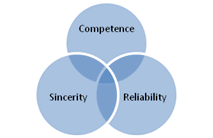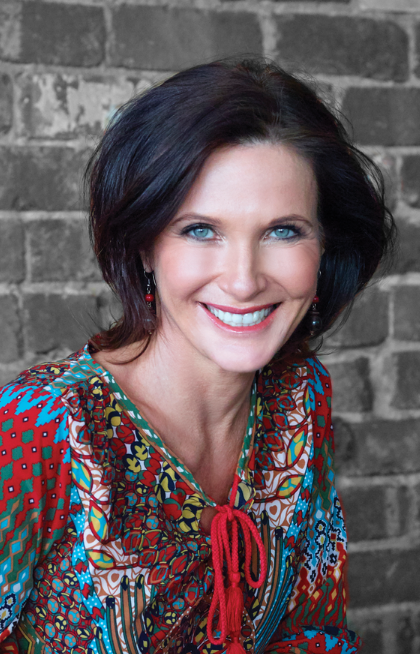Want to build more trust in your relationships?

I’m a pretty trusting person. And by and large I’ve found that it’s served me well to assume that most people are honest, well meaning and trust-worthy. That said, I’ve also learned from some less than pleasant experiences that there are times when I need hold back placing trust in someone or to just be more discerning what I trust them with. Like the time in back in my penny pinching university days when I foolishly trusted a roomate/novice hairdresser to put highlights in my hair. I looked like a leopard!
Trust lies at the core of all our relationships. And yet if you ask 100 people exactly what trust is you will likely get 100 different answers. The reason is that the concept of trust is complex and whilst we are often clear about who we trust (and don’t trust), we’re often much less clear about why.When working with clients on trust, many of whom have leadership roles in organizations and are faced with issues of trust (or lack thereof) daily, understanding the three key elements of trust can be helpful. My guess is they will also be helpful to you. First in enabling you to better distinguish specifically why you don’t trust someone and second in helping you become more effective in building trust yourself (or repairing it when damaged). After all, your ability to develop trusting relationships is pivotal to not only your personal relationships but to your effectiveness at work at every turn.
The Three Elements of Trust
The diagram below illustrates the inter-relationship between the three core elements of trust. Whenever a person is perceived to act in a way that undermines trust in any of these areas, trust overall is diminished.

Competence: The element of competence is what I call “domain specific” in that it depends on what area of expertise or skill you are assessing someone to be trustworthy in. For instance, you might trust me to cook you a roast dinner or to coach you to achieve a goal, but you wouldn’t trust me to give you a root canal (for good reason!). Likewise, I trust my kids to put their bikes away after they’ve ridden them but I would not trust them to cook me a roast dinner. Not yet anyway. More training is required! So the question to ask here is, “Does this person have the ability, knowledge, relevant experience and resources to perform this specific task in this domain of expertise?”
Reliability: Reliability is about whether you can count on someone to manage and honor their commitments. Or put another way, to do what they say they’ll do when they say they’ll do it. So you may trust someone to be competent at a particular task and sincere in their intention to do it, but their track record of unreliability, whether it be tardiness or sloppy work, keeps you from trusting them completely. The question to ask, “Can I count on this person to keep their promises and get the task done properly and by the agreed time frame?”
Sincerity: Sincerity relates directly to our assessment of someone’s character; to their fundamental integrity. Of all three elements of trust, sincerity is the hardest to build, and the most pivotal in our decision whether or not to place your trust in someone and it’s what we want, need and expect from those who are in positions of formal leadership – from our President to our company CEO (and explains why allegations of impropriety and infidelity create the media headlines they do when made against those in positions of public office and senior leadership.) Of course you may not necessarily care much whether the person cutting your hair is cheating on their tax return (or their spouse), but you may well care a lot if it was your local senator or boss. Sincerity is also the most difficult element to repair when damaged, which explains why infidelity has a far greater impact on a marriage than a spouse who simply forgets their anniversary. Or why discovering that a colleague has derided you behind your back does more damage than if they were just habitually running late for meetings. So the question to ask here is, “Is this person genuine and someone who means what they say with a strong sense of integrity?”
So, armed with new knowledge (and new competence!) in trust, how might you apply it in your relationships at work, with family members or friends? Of course, that’s not to say that you aren’t trustworthy right now, but take time to look at where you may have either inadvertently allowed trust to flat line through neglect or damaged it by your behavior. How might you build/restore trust if you were to:
- Develop skills to grow your competence in a particular area?
- Improve your punctuality?
- Share how you genuinely feel about an issue?
- When you have violated trust, apologized and sought to make amends?
- Manage your commitments more effectively so that you get things done properly and on time?
- Taken full responsibility for your consequences of your actions(even unintentional)?
- Attempt to make amends for a wrongdoing that damaged trust? (An exercise called “The Integrity Audit” in my book, Find Your Courage! is a great one for doing this.)
Distrust is Very Expensive
Ralph Waldo Emerson once wrote, “distrust is very expensive.” The fact is, without trust, influence wanes, intimacy erodes, relationships crumble, careers derail, organizations fail to prosper (and ultimately, also crumble) and, in short, nothing much works. Wherever trust is missing, opportunity is lost — opportunity to prosper, to exert influence, to deepen intimacy, to enjoy harmony, to collaborate, to foster understanding, to succeed at the very things that matter to you.
You cannot force others to become more trustworthy, but you can become more worthy of trust yourself. By raising your own bar, through your words and actions, and being the change you want to see in others you can ultimately create a more trusting environment around you. So no matter how full the trust accounts are in your relationships, it’s never too late to work at building rust and you can never work too hard at maintaining it.
Live Boldly, Shine Brightly, Be Trustworthy… and let me know your experiences of building and restoring trust!


